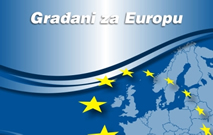Civil society connecting the EU and neighbouring countries
European Citizen Action Service jointly with the National Foundation for Civil Society Development and Impact - European Centre for Cross-Sector Partnership held an international conference in Zadar, Croatia, which focused on the development of civil society organisations in the Western Balkans (WB) and Eastern European countries of the European Neighbourhood Policy.
The conference gathered more then 100 civil society representatives from EU and neighbouring countries, donors active in the region as well as officials from national governments.
The outcome of the conference is a document entitled "Implementing the Ljubljana Declaration: Guidelines for National Action". Its ambition is to provide a comprehensive toolbox for national actions aiming at implementing the conclusion from the Ljubljana conference held in April this year.
This document gives recommendations to all three actors responsible for the establishment of sustainable and coordinated civil society in the Western Balkans and Eastern Europe: The EU, National governments and CSOs. Moreover, it calls for the integration of the conclusions of the ECAS' publication "Towards a sustainable Europe-wide Civil society", composed of national reports on the implementation of the Ljubljana Declaration, in the national dialogues and action plans.
Going beyond the declarative nature of the Ljubljana Declaration, the Guidelines propose concrete action points for each of the 10 recommendations transposable to the national contexts. The key message is once again to listen to civil society and recognise it as an independent actor in policy-making, and not merely an instrument for reform. These are some of the main recommendations for country action strategies which came out of the conference:
- Develop a long-term strategy for sustainability by engaging the CSO in analysis of their needs and a mapping of their sector ;
- Put the partnership principle which exists in EU regulations into practice and integrate it in all the partnership agreements between the EU and the National Governments in order to make it more binding;
- Reach local associations which represent 90% of a civil society by creating intermediary financing and capacity-building bodies;
- Support DECIM (donor exchange, coordination and information mechanisms) to create an enabling legal, fiscal and institutional framework for civil society development;
- Create networks of CSOs around common projects, actions or specific concerns in order so speak with a stronger voice to the government and the EU;
- Establish long term strategies for development of the Civil Society by developing consultation structures with governments and stepping up capacity building programmes.
Furthermore, the Guidelines set up a Roadmap for future events in order to measure progress and consult on the cross-sectoral and regional issues: mid-term conferences in Brussels to prepare national actions, as well as a yearly event similar to the Zadar conference to take stock of the national actions, examine the progress made and set up priorities for the future.
For further information please contact Kenan Hadzimusic, Project Manager at kenan.hadzimusic@ecas.org.
Tony Venables Director, ECAS, Brussels
Cvjetana Plavsa-Matic Director, NFCSD, Zagreb


